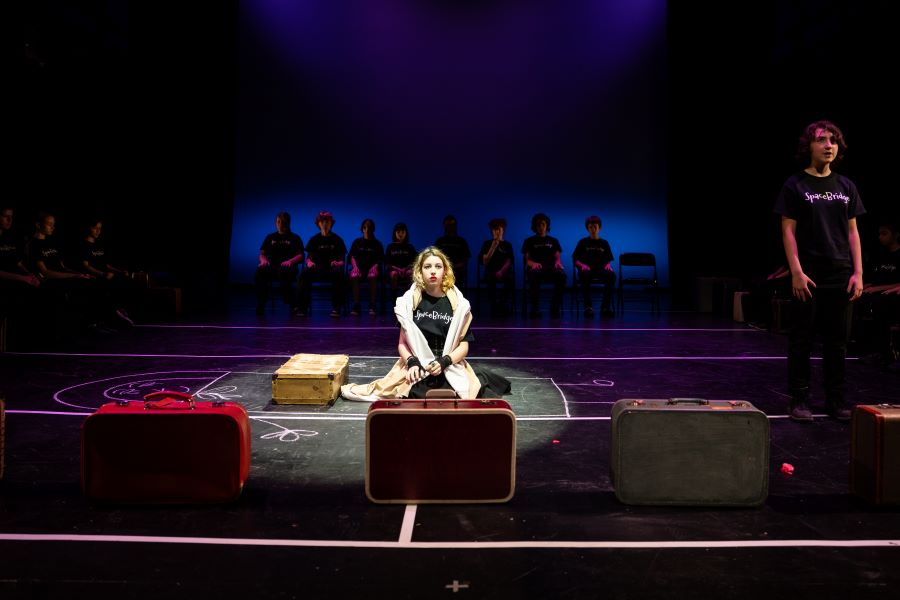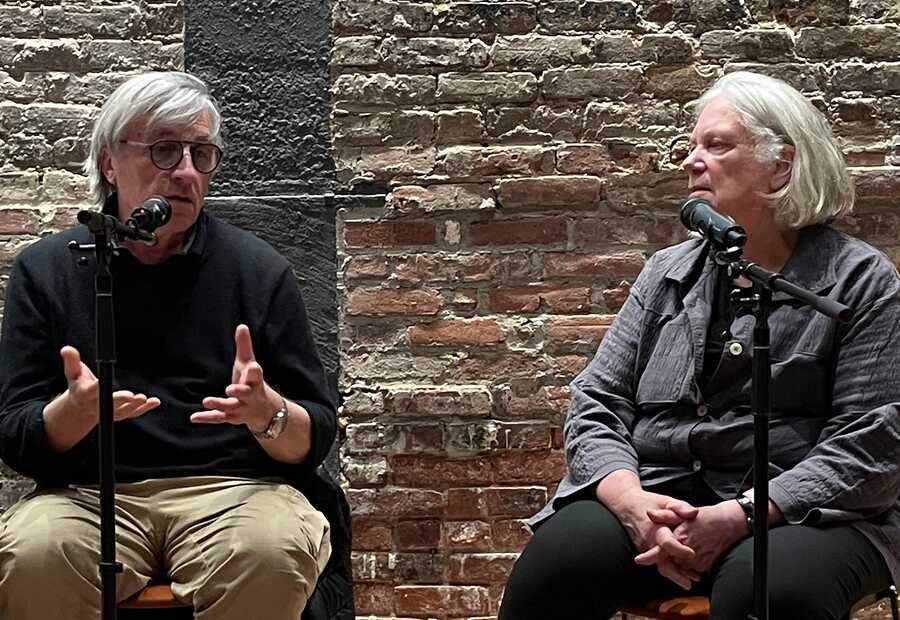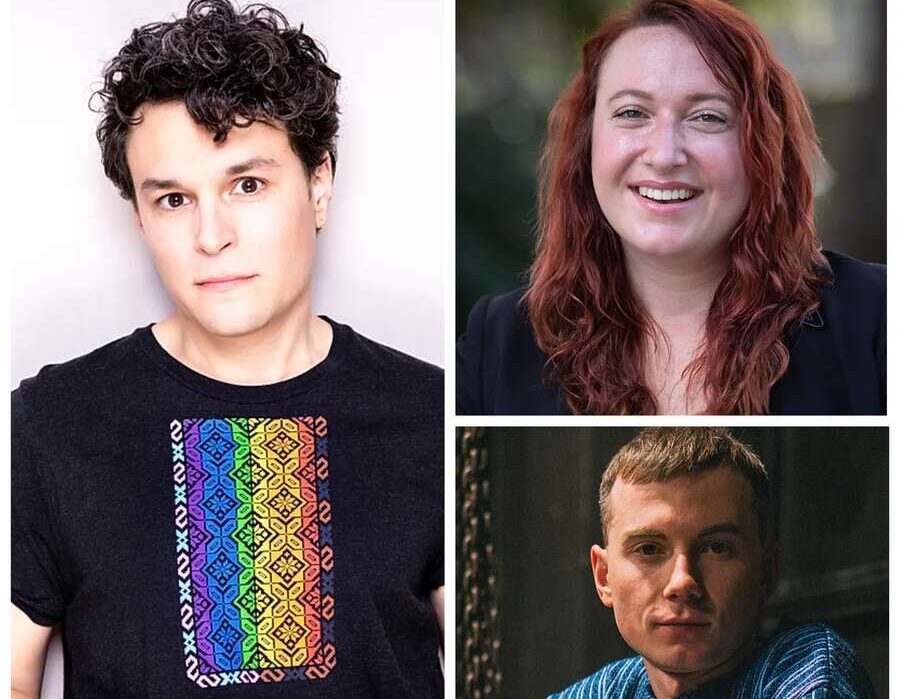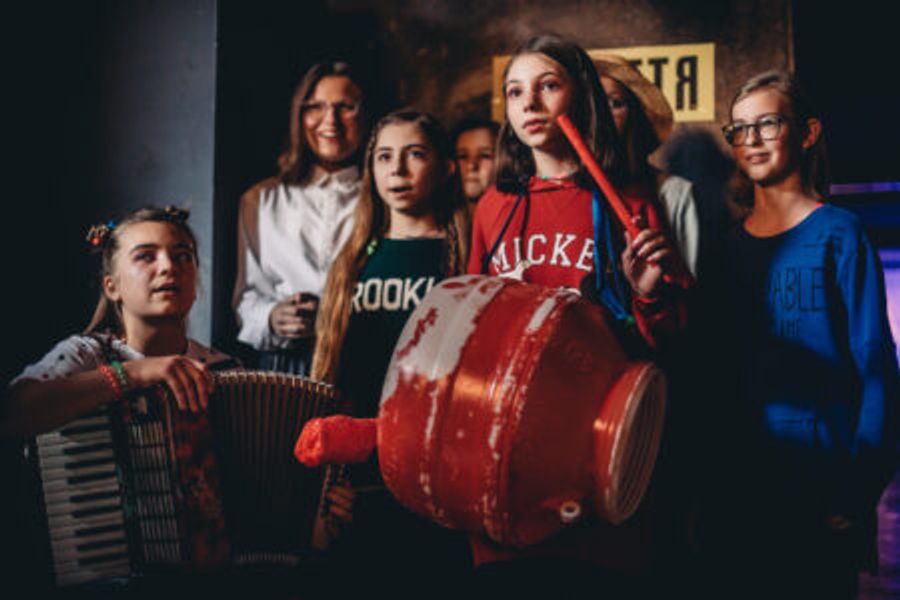“It’s such a simple idea, really: a way of connecting people and changing their lives….in the theatre,” said theatremaker Irina Kruzhilina of her latest passion project.
Its seeds were planted on Dec. 31, 1999, when Vladimir Putin first came to power and Kruzhilina knew she had to leave Russia. She subsequently found a new life in New York City, where she teaches in the Contemporary Theatre and Performance MFA program of the New School.
At the same time, however, she remained deeply concerned about the dynamic between Russians and Americans that she was experiencing: a mutual distrust, a reluctance to connect, to converse, to express interest. Her concern was heightened after the Russian invasion of Ukraine in February 2022, resulting not only in a flood of refugee families from Ukraine but also a stream of Russians seeking political asylum in the U.S. because of their antiwar views. Many were journalists, educators, and others targeted as being anti-government.
“Seldom do we hear stories about those Russians who stand up for what they believe is right, and the brutal consequences they face when they do,” Kruzhilina explained in an interview last fall. She cited one story about a teenage girl in Russia named Masha, who drew an anti-war picture in her art class, and was consequently thrown into an orphanage while her father was sent to prison.
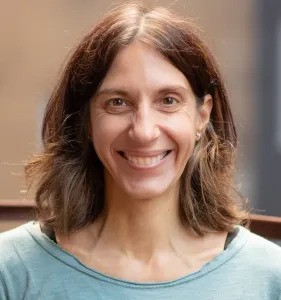
Frightened Russians fled in family units, embarking on a perilous route that took them through Russia, across the sea to Mexico, and finally to New York, where they were housed in New York City shelters sponsored by the Department of Homeless Services, waiting to apply for asylum. Most of the refugees were children traveling with their mothers (who had to borrow thousands to make the journey). Kruzhilina was particularly moved by the story of one anti-Putin journalist living in a shelter with her 12-year-old daughter who was being bullied in a New York public school.
“We don’t know the stories of these Russian children,” Kruzhilina said. “It had reached the level of a humanitarian crisis. I was alarmed, and I knew I had to do something about it.”
The idea came to Kruzhilina: Bring Russian émigré children living in New York shelters together with American children and create a theatre project that would build friendships, promote compassion and mutual understanding, and start to bridge the gap between desperate Russian refugees and mistrustful Americans. So Kruzhilina created SpaceBridge, named after the 1982 satellite-mediated television programs between the U.S. and the USSR used to facilitate communication between citizens of these two countries.
Her new theatre project consisted of a series of 10 workshops involving 11 young Russian refugees between the ages of 10 and 14, recruited by Kruzhilina herself from the New York shelters where they lived, and eight young Americans who volunteered for the project. La MaMa Experimental Theatre Club provided the rehearsal space for the workshops, conducted over a two-month period from October to December of 2023.
In the first few workshops, under Kruzhilina’s direction, the Russian children were invited to share their stories and express their feelings of loss and grief for a country that they once called home and for a parent they had left behind. In the second phase of the workshops, the eight American youngsters joined the Russians to hear their stories, develop friendships, and envision together a future of intercultural unity and support. As theatre exercises, they designed an ideal school and constructed new models for a more effective United Nations.
“We have to help them, our friends can’t go back!”
The SpaceBridge workshops culminated in a presentation on Dec. 9, 2023, in the Community Arts Space at La MaMa. According to Kruzhilina, this left an indelible impression on the participating youngsters. For the Russian children, it created a feeling of “home,” a safe place where they could express their experiences and create new friendships. For the American children, it developed their capacity to empathize with other children whom they initially perceived as “the other.” It also helped them to challenge the negative opinions of Russians that they had been taught by family members and others in their communities.
According to Kruzhilina, the response was exciting. An enthusiastic En Garde Arts joined La MaMa in support of SpaceBridge, providing this groundbreaking new project with an award and a stipend to continue expanding the workshops into a devised theatre piece. That’s when Kruzhilina initiated a series of 20 rehearsals to create a script that she proudly describes as “authored by the kids themselves.”
As a framework for the workshops she had already created, Kruzhilina came up with the inspired idea of a narrator. She chose Samantha Smith (1972-1985), a young girl from Maine who wrote an anti-nuclear-war letter to Yuri Andropov, leader of the Soviet Union, in November 1982, pleading for world peace. “P.S. Please write back,” she added. And he did, with an invitation to visit Russia in July 1983 with her parents. She became known as “America’s littlest ambassador,” suggesting that Andropov and President Reagan should exchange granddaughters for two weeks to promote the cause.
“If I were alive, I would be 52 today,” said Ellen Lauren, the American actress playing Samantha Smith. She was introducing herself in Chapter I of the new piece titled “A Girl From Maine” during a presentation of the devised work SpaceBridge, performed last June in front of a captivated capacity audience at La MaMa ETC, in a co-production with En Garde Arts and Kruzhilina’s newly formed company Visual Echo. Lauren as Smith then went on to narrate one of the most moving theatre works I’ve ever witnessed.
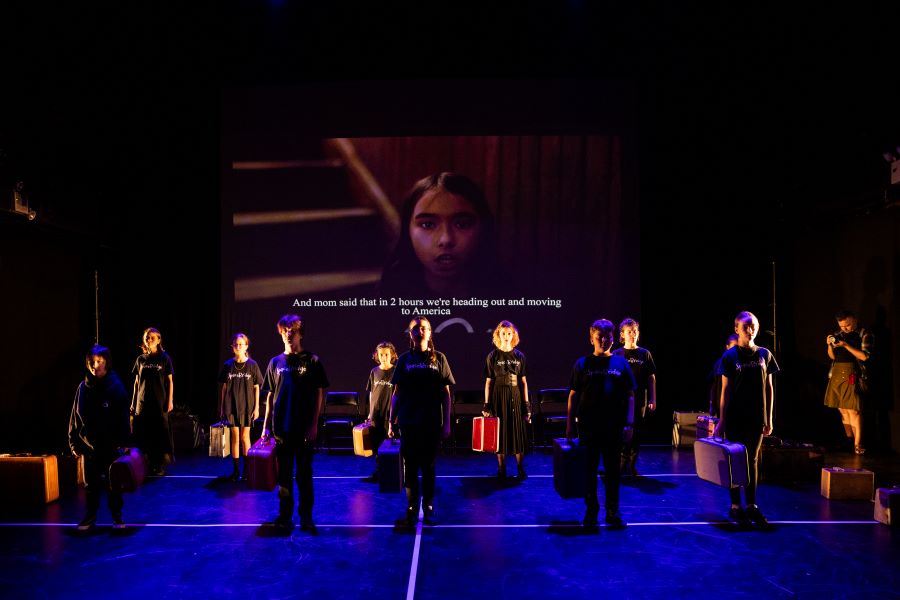
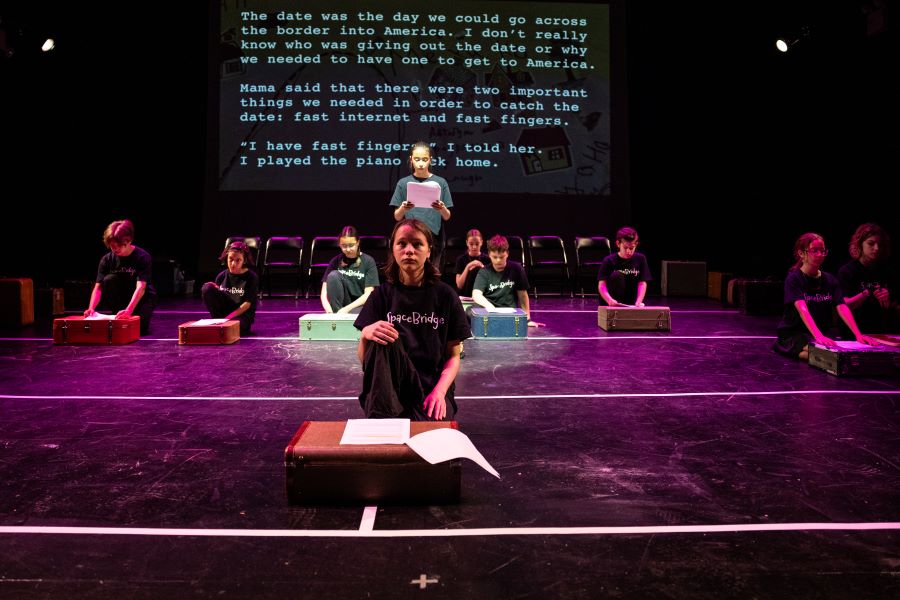



In Chapter II, titled “The Departure,” the 11 Russian children enter the theatre’s empty space, each carrying a suitcase. They introduce themselves to the audience with their first names and a word or two about their identity—e.g., “I love pizza,” or, “My idol is Bette Midler.” One by one, they tell the traumatic stories of how they learned they were departing Russia. One says she knew ever since opposition leader Alexei Navalny was poisoned in 2020. Another says she was told two hours before they left in 2022.
Several wonder: “What about my friends? My teachers? What will they say?” One said he wept when he heard they would have to leave “dedushka” and “babushka” (grandmother and grandfather). One asked if he could pack his toy cars and Legos. One was told that the family was leaving on vacation and didn’t learn the truth until they were in the taxi on the way to the airport. In many cases, a child left together with their siblings but only with one parent (typically, the mother).
Collating the details of their individual departures, they created one “composite” child named Masha to tell the story of her arduous journey from Russia to the U.S., which lasted almost two months. Masha packed her stuffed rabbit and said goodbye to her dog (named “Dog”), but compensates for her loss by dreaming that she will meet her idol in America—namely, Sarah Jessica Parker.
She travels with her mother, younger brother, and sister. From the Russian city of Perm, they take an airplane to Yekaterinburg, to Baku in Azerbaijan, then to Mexico City, then to Tijuana. There they discover that their internet connection, which they desperately need for an online lottery to enter the U.S., is not adequate. So they keep moving closer to the U.S. border until their internet connection improves, from Tijuana to Hermosillo and finally to Nogales, where they cross the border into Arizona, then fly to Chicago and finally New York City. There they move from shelter to shelter (Williamsburg, the Bronx), while Masha seizes every opportunity to find a TV, scouring the channels in search of Sarah Jessica Parker.
The Russian children share their feelings and anxieties about being new immigrants. “I worry that I will never finds friends here,” says one. “I’ll be sent back to Russia,” worries another. “I worry that Donald Trump will win.” And so on. At school they have trouble making friends, and suffer from bullying and hate email.
Then the eight American youngsters enter, of roughly the same ages as the Russians. They introduce themselves, explaining that many of them had never spoken to a Russian person before. Subsequently, they share a series of bonding theatre exercises that, as Samantha Smith explains, will help to foster mutual understanding and support. Together, they create a TV series called Far From Home on “NY2 channel.” In the most poignant episode of the series, “If I Were To Return,” the Russian youngsters express their fears to their new American friends about if they were to return to Russia: “I would be bullied at school,” “I would be called a traitor,” “We would be called public enemies,” “My father would be sent to the army, or prison, and I would be put in an orphanage,” “My friends warned me on social media that if I return they would beat me up,” “We would be lined up in front of a firing squad,” etc.
Says one child, “It would be dangerous for my mother—my father was angry that we left and he would snitch on my mother and she would be thrown in prison.”
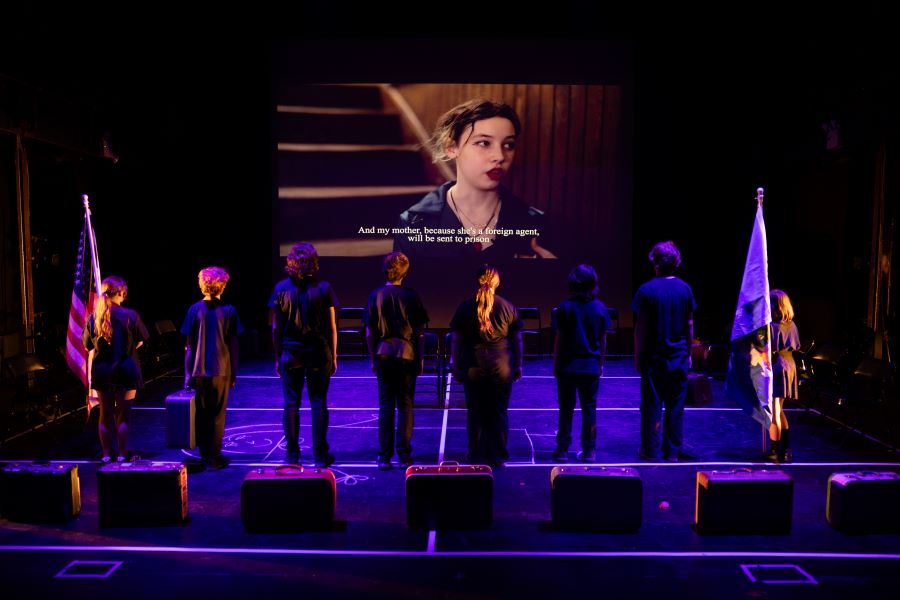



In response to these fears, the American youngsters declare emphatically, “We have to help them, our friends can’t go back!” In the ensuing episode, they become the advocates for their new Russian friends as they face the nightmarish process of applying for asylum: There are 10,000 Russian cases pending in New York, with an average wait of four years; only 50 percent of cases are granted. They enact an immigration hearing, with Samantha Smith as the bewigged judge. “They deserve this chance!” declare the American youngsters. “We are proud to stand here and have their support!” declare the Russian youngsters.
“There wasn’t a dry eye in the house,” reported Kruzhilina of the performance. Subsequently, SpaceBridge was invited to participate in New York’s upcoming Under the Radar Festival, with six performances of their newly devised work to run Jan. 7-11, 2025 at La MaMa.
Meanwhile, Kruzhilina has a vision of expanding SpaceBridge internationally to work with any refugees in any country. “There is so much hate toward one another—we need the voice of Samantha Smith now!” Kruzhilina said. “That’s my dream. Refugee programs will become more and more urgent, and we have to find a creative way.”
They have found the way already in the theatre. It will help us to live together in these perilous times and change the way we see the world—through the truth-seeing eyes of truth-telling children.
Carol Rocamora is an educator, translator, playwright, and critic.
Support American Theatre: a just and thriving theatre ecology begins with information for all. Please join us in this mission by joining TCG, which entitles you to copies of our quarterly print magazine and helps support a long legacy of quality nonprofit arts journalism.

